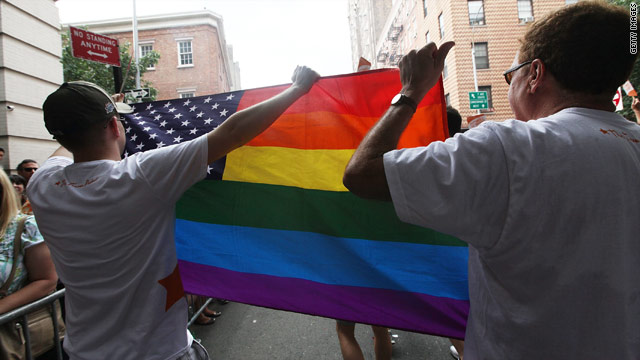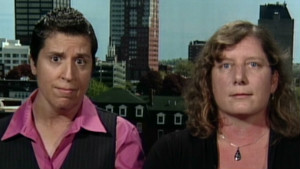DOVER, Del. (AP) — Mikki Snyder-Hall married her partner, Claire, in California in 2008, and moved two years ago to Rehoboth, a gay-friendly Delaware beach town.
Now they’re looking forward to July 1, when Delaware officially becomes the 11th state in the nation to allow same-sex marriage after Gov. Jack Markell signed a gay marriage bill into law Tuesday.
“As of July, we are considered married,” said Snyder-Hall said. The couple said that while they don’t intend to have another wedding ceremony, they may have another reception to celebrate their new legal status in Delaware.
Markell, a Democrat, signed the measure into law just minutes after its passage by the state Senate on Tuesday.
“I do not intend to make any of you wait one moment longer,” a smiling Markell told about 200 jubilant supporters who erupted in cheers and applause following the 12-9 Senate vote barely half an hour earlier.
(MORE: How Gay Marriage Won)
“Delaware should be, is and will be a welcoming place to live and love and to raise a family for all who call our great state home,” Markell said.
Delaware’s same-sex marriage bill was introduced in the Democratic-controlled legislature barely a year after the state began recognizing same-sex civil unions. The bill won passage two weeks ago in the state House on a 23-18 vote.
(paragraph 8 ) While it doesn’t give same-sex couples any more rights or benefits under Delaware law than they have in civil unions, supporters argued that same-sex couples deserve the dignity and respect of married couples. They also noted that if the U.S. Supreme Court strikes down the Defense of Marriage Act, which bars married gay couples from receiving federal benefits, civil unions would not provide protections or tax benefits under federal law to same-sex couples in Delaware.
“All couples under the law should be treated equally by their government,” Lisa Goodman, president of Equality Delaware, a gay rights group that drafted the legislation and led the effort to get it passed, told lawmakers near the end of Tuesday’s three-hour debate.
Under the bill, no new civil unions will be performed in Delaware after July 1, and existing civil unions will be converted to marriages over the next year. The legislation also states that same-sex unions established in other states will be treated the same as marriages under Delaware law.
Scott Forrest, 50, of Newark said he and his partner of almost 21 years, Kevin Fenimore, look forward to having the civil union they entered into last year converted to marriage.
“I am elated,” he said.
Lambda Legal, a national gay rights advocacy group, applauded passage of Delaware’s gay marriage bill.
“Today, we celebrate with the thousands of Delaware same-sex couples and their children who will soon be able to have the full recognition and respect accorded to married families,” Susan Sommer, director of constitutional litigation at Lambda Legal, said in a statement.
Tuesday’s debate included the first public acknowledgment by Sen. Karen Peterson, D-Stanton, that she is a lesbian. Saying she and her partner of 24 years entered into a civil union last year, Peterson rejected the notion that people choose to be gay, any more than they choose to be heterosexual.
“We are what God made us. We don’t need to be fixed, we’re not broken,” said Peterson, 63, adding that if her pursuit of happiness affects someone else’s marriage, perhaps they need to work on their marriage.
(INTERACTIVE: Timeline of the Gay Rights Movement in the U.S.)
But opponents of gay marriage, including scores of conservative religious leaders from across the state, argued that same-sex marriage redefines and destroys a centuries-old institution that is a building block of society.
“Let’s be careful about the concept of social evolution,” said the Rev. Leonard Klein, a Roman Catholic priest speaking on behalf of the bishop of the Catholic Diocese of Wilmington, which serves more than 200,000 Catholics in Delaware and Maryland’s Eastern Shore.
“When you remove male and female from the definition of marriage, all bets are off,” added Klein, who urged lawmakers to show an “appropriate humility” for thousands of years of human experience.
Opponents also argued that the gay marriage will bring unintended and unforeseen consequences on broader issues ranging from religious freedom to school curricula and could be used as a basis to argue for acceptance of even more forms of marriage, such as polygamy.
“We’re about to change the entire definition of marriage in order to make people feel good about themselves,” said the Rev. Chuck Betters, pastor of Glasgow Reformed Presbyterian Church in Bear. Betters recounted how he became the subject of scathing attacks in social media recently after posting a sign outside his church suggesting that Christianity was more powerful than the movement for gay marriage.
The new law does not force clerics to perform same-sex marriages that conflict with their religious beliefs. But under an existing Delaware law banning discrimination based on sexual orientation, business owners who refuse to provide marriage-related services to same-sex couples for reasons of conscience could be subject to discrimination claims.
Delaware joins neighboring Maryland and the nearby District of Columbia as jurisdictions that have approved gay marriage. Last week, Rhode Island became the 10th state to allow gay and lesbian couples to wed, with independent Gov. Lincoln Chafee signing the bill an hour after its final passage.
Minnesota appeared poised to legalize gay marriage after the Democratic speaker of the state House said Tuesday that a gay marriage bill endorsed by the governor and likely to pass in the state Senate also now has enough backing in his chamber. The House will vote on the measure Thursday, and if it passes, the Democratic-led Senate could vote on it as soon as Saturday.



